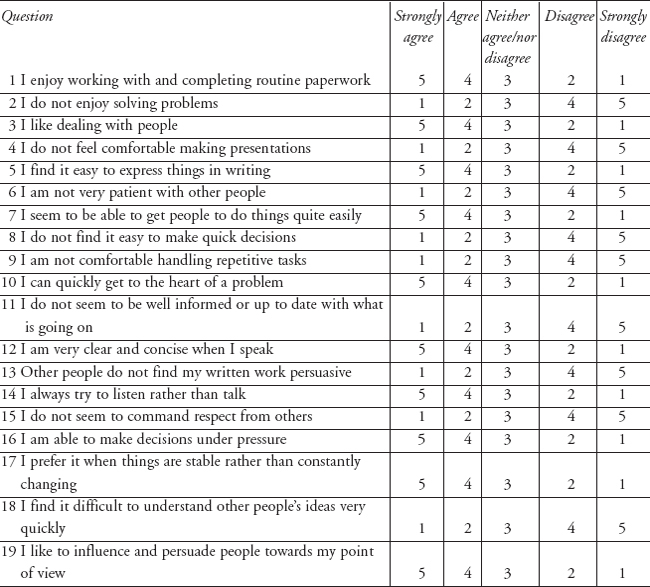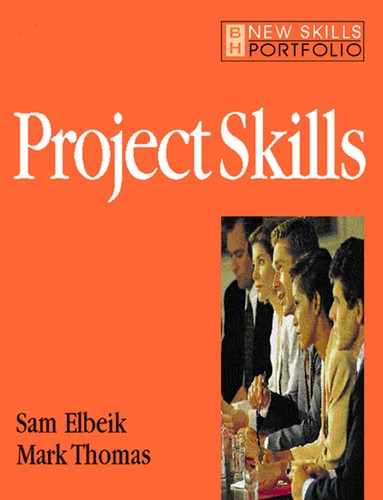11 |
Assessing your skills |
Skills needed to manage projects
 |
Project management and golf have some similarities: – The more you practise, the better your drive. – Tips and tricks are mandatory for winning! (Gregoire Bouille, MIS Analyst – Methodology and Education, Philip Morris) |
This chapter will assist you in developing your effectiveness as a project manager. It is divided into two parts. Part 1 presents you with a checklist of questions concerning your project management skills, which will help you focus on the key areas. Part 2 provides you with an analysis of the skills and scope for thinking about your personal development.
Eight project management skills dimensions
There are eight skill dimensions to master in managing projects:
1 Administrator.
2 Analyst.
3 Negotiator.
4 Verbal communicator.
5 Written communicator.
6 Listener.
7 Motivator.
8 Decision-maker.
It is the combination of using all these skills at appropriate times during the cycle of a project that will make you an effective project manager.
Part 1: checklist of questions
 |
Individually work through the following statements and tick the answer most appropriate to you. For example, if you strongly agree with a question, then place a tick against that question under the heading ‘Strongly agree’.You should spend no more than ten minutes answering these questions. |


Part 2: preparing and analysing your score
 |
Enter your score for each statement from the checklist above in the appropriate numbered box below.You will find the score in the box that you ticked for each answer. For example, if you scored 5 for question 1, then enter the number 5 in box 1 below. Then add up your scores in each row and enter the total in the box provided and then rank your scores from 1 (highest) to 8 (lowest). |

Score summary
Below are the eight skill dimensions to master in managing. Transfer your score from above to the following table and rank your score. This will allow you to focus on dimensions which show scope for further improvement.
| Skill dimension | Your score | Rank |
| Administrator | ||
| Analyst | ||
| Negotiator | ||
| Verbal communicator | ||
| Written communicator | ||
| Listener | ||
| Motivator | ||
| Decision-maker |
Results
For each skill area, compare your score with the bands presented below and consider the appropriate action suggested.
| 24 - 30 | Excellent | You possess all the right skills to be effective in this area |
| 20 - 23 | Good | An effective performance score. However, you can still enhance your skills in this area |
| 17 - 19 | Moderate | Your score indicates that you need to review your skills in this area |
| 12 - 16 | Improvement needed | Your score suggest that you need to make significant improvements to your skills in this area |
| 6 - 11 | Major development need identified | Urgent action is needed for you to improve your skills in this area |
Personal development: your task now
Review your score above. If there is a suggestion for further improvement, turn to the appropriate following sections in this chapter and develop your personal action plan.
 |
This analysis is neither a performance appraisal nor definitive statement of your capability as a project manager. Use it to help you identify areas to further develop your skills and performance in managing projects and to develop your own plan for action. |
Administrator
 |
The administrator characteristic is defined as a set of behaviours, which involve the following: |
|
This characteristic is needed in the following areas:
1 Preparing the Terms of Reference.
2 Managing the communications surrounding a project.
3 Organizing meetings – venues, facilities, agendas, participants.
4 Preparing meeting minutes, especially progress and review meetings.
5 Scheduling work plans of project team members.
6 Gathering and collating progress reports and recording these against the master plan.
7 Chasing project members for updates and materials.
8 Arranging travel and accommodation plans.
9 Alerting project members to problem areas.
10 Producing hard copy records of the project’s progress.
 |
Select two of the ten items above in which you would like to improve your performance. Record this in the left-hand column below. After discussing your thoughts with a colleague, record in the right-hand column some specific actions you propose to take to improve your performance. |
| I must improve my skills in: | I will: |
|
|
Analyst
 |
The analyst characteristic is defined as a set of behaviours involving the following: |
|
This characteristic is needed in the following areas:
1 Preparing the project’s terms of reference.
2 Preparing a breakdown of tasks.
3 Establish task dependencies.
4 Estimate a project’s effort and duration.
5 Determine the project’s duration using network charts.
6 Determining the critical path of tasks.
7 Allocating resources.
8 Preparing a risk analysis.
9 Preparing a contingency plan.
10 Reviewing progress against plan.
11 Replanning.
 |
Select two of the eleven items above in which you would like to improve your performance. Record this in the left-hand column below. After discussing your thoughts with a colleague, record in the right-hand column some specific actions you propose to take to improve your performance. |
| I must improve my skills in: | I will: |
|
|
Negotiator
 |
The negotiator characteristic is defined as a set of behaviours involving the following: |
|
This characteristic is needed in the following areas:
1 Preparing the terms of reference
2 Persuade others to commit to or join the project team/goals
3 Harnessing resources for the project
4 Managing key project stakeholders
5 Confronting team members and stakeholders on failures to deliver
6 Negotiating new actions at project review meetings
7 Negotiating new terms when plans change
 |
Select two of the seven items above in which you would like to improve your performance. Record this in the left-hand column below. After discussing your thoughts with a colleague, record in the righthand column some specific actions you propose to take to improve your performance. |
| I must improve my skills in: | I will: |
|
|
Verbal communicator
 |
The verbal communicator characteristic is defined as a set of behaviours involving the following: |
|
This characteristic is needed in the following areas:
1 Preparing the terms of reference.
2 Facilitating group/team discussions, e.g. estimating effort and duration, risk analysis.
3 Addressing the team.
4 Presenting progress at review meetings.
5 Presenting findings.
6 Acting as an intermediary between various project stakeholders.
7 Surfacing difficult or uncomfortable project issues.
 |
Select two of the ten items above in which you would like to improve your performance. Record this in the left-hand column below. After discussing your thoughts with a colleague, record in the right-hand column some specific actions you propose to take to improve your performance. |
| I must improve my skills in: | I will: |
|
|
Written communicator
 |
The written communicator characteristic is defined as a set of behaviours involving the following: |
|
This characteristic is needed in the following areas:
1 Preparing the terms of reference.
2 Recording notes from project meetings.
3 Communicating to team members and project stakeholders.
4 Negotiating situations.
5 Where tact and sensitivity maybe required
6 Preparing written outputs of a project plan, e.g. analysis matrix, risk and contingency.
7 Preparing progress papers and documents.
8 Assisting in formal presentations.
9 Producing draft proposals and discussion documents.
10 Producing final project reports.
 |
Select two of the ten items above in which you would like to improve your performance. Record this in the left-hand column below. After discussing your thoughts with a colleague, record in the right-hand column some specific actions you propose to take to improve your performance. |
| I must improve my skills in: | I will: |
|
|
Listener
 |
The listener characteristic is defined as a set of behaviours involving the following: |
|
This characteristic is needed in the following areas:
1 Preparing the terms of reference.
2 Gathering group ideas at project meetings.
3 Stimulating team discussions.
4 Managing difficult team disputes.
5 Managing one-to-one relationships.
6 Dealing with difficult people.
7 Managing stakeholder meetings.
 |
Select two of the seven items above in which you would like to improve your performance. Record this in the left-hand column below. After discussing your thoughts with a colleague, record in the righthand column some specific actions you propose to take to improve your performance. |
| I must improve my skills in: | I will: |
|
|
Motivator
 |
The motivator characteristic is defined as a set of behaviours involving the following: |
|
This characteristic is needed in the following areas:
1 Preparing the terms of reference.
2 Motivating team members to ‘buy into the project’.
3 Motivating team members to complete their work and tasks.
4 Giving advice and guidance when needed.
5 Moments of poor progress, low morale or major setbacks.
6 Participating in team activities such as estimating effort, preparing plans.
7 Encouraging participants to higher levels of performance.
8 Persuading supporters and stakeholders.
 |
Select two of the eight items above in which you would like to improve your performance. Record this in the left-hand column below. After discussing your thoughts with a colleague, record in the right-hand column some specific actions you propose to take to improve your performance. |
| I must improve my skills in: | I will: |
|
|
Decision-maker
 |
The decision-maker characteristic is defined as a set of behaviours involving the following: |
|
This characteristic is needed in the following areas:
1 Agreeing the terms of reference with the sponsor.
2 Making decisions with TOR changes.
3 Deciding on the uses of project resources.
4 Resolving conflicts between team members or stakeholders.
5 Prioritizing tasks in the face of competing demands.
Select two of the five items above in which you would like to improve your performance. Record this in the left-hand column below. After discussing your thoughts with a colleague, record in the right-hand column some specific actions you propose to take to improve your performance.
| I must improve my skills in: | I will: |
|
|
